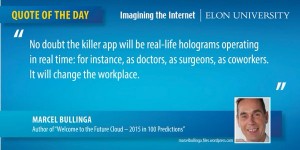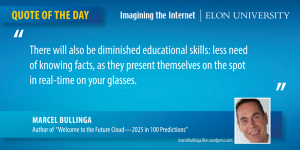Some of the most prominent and respected technology experts and analysts made far-ranging predictions about the Internet of Things and privacy in PEW’s Research Report Digital Life in 2025. Some 2,558 experts find striking patterns in their predictions. They predict the Internet will become ‘like electricity’ – less visible, yet more deeply embedded in people’s lives, for good and ill. The Internet of Things will thrive by 2025. And the major threats are governments and multinationals. In 2012, PEW conducted a grand survey, Hyperconnected Youth in 2020. Futurist Marcel Bullinga contributed to both reports.
If you do not have time to read the 2 reports, or Marcel’s contributions down under, then read the news coverage. Some of Marcel’s views, like “cloud immigrants” and “home holodecks” made the headlines:
- DailyMail (UK): “Home holodecks, personalised diets and freshly 3D printed clothes every morning: Researchers reveal their predictions for life in 2025”
- The Guardian (UK): “Holodeck entertainment, full video lifestreaming, scientific diets and more 2025 predictions from Pew Internet’s new report”
- Beta News: “Threats to the internet in 2025 — start worrying now”
- MailOnline (US): “‘Cloud immigrants’, mind control apps and human operating systems: Experts reveal how superfast web speeds will change the world by 2025”
- The Motley Fool: “5 Wild Internet of Things Predictions. Automatic information. Wearables as embedded devices. The death of privacy. Social sharing like never before. Digesting intelligence”
- Washington Times: “Privacy may be a ‘luxury’ in 10 years. ‘Smart appliances’ will help families, but change society”
- CNN News: “Will we give up privacy without a fight? New Pew survey asks experts what privacy will look like in 10 years. Living in public is expected to become the new default. Some people willingly trade their privacy for convenience and services. New tools might give people control over their data, at a cost”
- For Dutch readers: 1 small news item in a small computermagazine… ComputerWorld (NL): “Deskundigen zetten vraagtekens bij Internet of Things. Is het Internet of Things een positieve trend? Deskundigen denken dat we in 2025 overal met alles verbonden zijn, maar zijn wel kritisch”
Marcel Bullinga’s quotes (his contributions to both the 2012 and 2014 reports):
 “Copyright and patent will die away”
“Copyright and patent will die away”
Marcel Bullinga, technology futures speaker, trend watcher, and futurist, said, “Sharing is hindered by ridiculous 19th century laws about copyright and patent. Both will die away. That will spur innovation into the extreme. That is the real singularity.” – Read full report on Net Threats
“There will be de-skilling in workplaces and personal anti-video firewalls to protect people from spying”Marcel Bullinga, futurist and author of author of Welcome to the Future Cloud—2025 in 100 Predictions, responded, “There will be benefits and threats at the same time, of course. Two major areas of impact will be work and education. There will be diminished work skills … There will also be diminished educational skills: less need of knowing facts, as they present themselves on the spot in real-time on your glasses. A major global megatrend here is de-skilling—our children will learn less and achieve more. Of course, they will also suffer from major social media stress traumas.
The rise of the body-as-key and the body-as-interface is highly likely because the advantages are clear in terms of better decision-making on the spot, but it will also raise major social distress, not because of the augmented reality part, but because of the video-capture feature. We will not only have Google Glass-free zones everywhere, but also personal anti video firewalls around our body, protecting us from spying.” – Read full report with Guru’s Answers
“Not ownership but access is the key to the future. We need Spotify houses and Ikea homes”
Marcel Bullinga, futurist and author of author of Welcome to the Future Cloud—2025 in 100 Predictions, responded, “The future will be cheap—due to the fact we can print everything, know almost everything, and share everything: knowledge, innovation, infrastructure. The future will also be highly competitive, raising much social distress, and we will suffer from a massive lack of focus and mindfulness. The key to the future is not ownership but access. We need trendhouses: houses that we do not own, but that we are subscribed to. We need a subscription to health-, living-, and energy services. Spotify-houses and Ikea-homes in one.” – Read full report
Contribution to a survey by PEW Internet Research about The Future of Privacy by futurist Marcel Bullinga. Together with global experts like Vint Cerf, Jeff Jarvis, Howard Rheingold and Paul Saffo.

‘In 2025, we will have a post-Facebook and post-Google world’
Marcel Bullinga, a technology futures speaker, trend watcher, and futurist, wrote, “A trusted infrastructure needs to be created in order to prevent massive fraud and massive public distrust in online transactions, and in online life, in general. We have to reinvent the entire Internet as we know it, shifting power from a few American tech companies to the individual who creates, and therefore owns, the data. We need to create a personal dashboard, a safe haven, for every individual’s dossiers, transactions, money, and profiles. In this dashboard, you could set your privacy and communications settings (from 0 to 100%).
All of this will create a big struggle about the question: Who owns (my) data? My 2025 statement: In 2025, we will have a post-Facebook and post-Google world. We will have new business models in which facilitating data is more lucrative than owning data. Providers who refrain from owning their customers’ data and stick to facilitating the owner in handling their data in a trusted way will win. This means Google and Facebook will lose. If we do not make this transition, we face a privacy and fraud nightmare in which our lives are dominated by a few global tech companies…
There are two opposite trends: first, we will adapt to 100% transparency and the utter loss of privacy, accepting that secrets no longer exist. The societal impact of scandals (exposed secrets) will diminish because it is impossible to react with constant indignation when secrets are revealed all the time.
Second, we will adapt to 100% privacy. Counter technologies will give us huge amounts of privacy protection, allowing us to pick our own desired level of privacy. Privacy will cost money and will be a paid service.”
Please, parents!
Marcel Bullinga, author of Welcome to the Future Cloud – 2025 in 100 Predictions, observed that we have to start with people’s upbringing in order to instill within all the appropriate respect for all. “Please, parents of the world,” he wrote, “start raising your children again and teach them about the virtue of doing good. Back to the 1950s!”
The Future of Corporate Responsibility, PEW Research (2012)
The Always On Youth needs time-out zones
Futurist Marcel Bullinga contributed to PEW report by global experts about youth in 2020 (February 2012). Imaging the Internet / PEW Research: Youth in 2020. General conclusion: “Always On youth will both profit from and suffer because of their hyperconnected lifes”. Marcel Bullinga’s advice: “We need time-out zones at school, meditation classes without smartphone and education in ignoring people.”
The Editorial says:
• Reform of the education system is necessary to help learners know how to maximize the best and minimize the worst. Reform could start by recognizing that distractions of all kinds are the norm now. Educators should teach the management of multiple information streams, emphasizing the skills of filtering, analyzing, and synthesizing information. Also of value is an appreciation for silence, focused contemplation, and “lessons in ignoring people,” as futurist Marcel Bullinga put it.
Marcel Bullinga explains:
• “I call the virtual teens and adults the Game Generation. Game Generation teens will build, not lack, social skills online and they will be able to transfer them to the face-to-face world. They will also learn and work as if they are in a game. Game Generation teens and adults will have lasting problems with focus and attention. They find distraction while working, distraction while driving, distraction while talking to the neighbours. Parents and teachers will have to invest major time and efforts into solving this issue. Silence zones, time-out zones, meditation classes without mobile, lessons in ignoring people. All in all, I think the negative side effects can be healed and positive outcomes will prevail.” — Marcel Bullinga, futurist and author of Welcome to the Future Cloud—2025 in 100 Predictions; based in Amsterdam, The Netherlands

